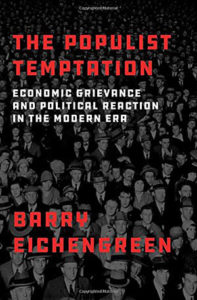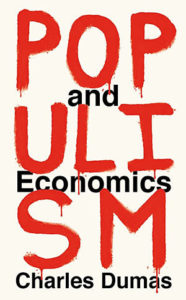Across the world, liberal democracy is rumored to be under threat from the rise of autocratic regimes and populist politics [or simply facing a mid-life crisis?]. But if this is the case, how can it be saved? Takis S. Pappas, author of the forthcoming Populism and Liberal Democracy, argues that the root cause of the current crisis is today’s democratic leaders lack assertiveness in defending the principles that underpin liberal democracy: to reaffirm and defend those principles will require steadfast leadership.
In a recent book-length essay, Ivan Krastev, one of Europe’s most brilliant thinkers, contends that, as liberal democracy is now crumbling, its greatest achievements, including the European Union, are likely to disintegrate without anyone being able to prevent the destruction, he writes for the LSE’s Europp – European Politics and Policy blog:
 While there is no doubt that today’s dismal state of democracy has many causes, the most important of them is that democratic leaders are not assertive enough in defending the principles that underpin it. To reaffirm and defend those principles requires steadfast leadership. Where such leadership exists, liberal democracy stands a good chance of being saved. Look, for instance, at Angela Merkel’s principled decision in the summer of 2015 for an open-door refugee policy, the cases of Emmanuel Macron and Albert Rivera, who reversed the populist tides in France and Spain respectively, or of the late John McCain.
While there is no doubt that today’s dismal state of democracy has many causes, the most important of them is that democratic leaders are not assertive enough in defending the principles that underpin it. To reaffirm and defend those principles requires steadfast leadership. Where such leadership exists, liberal democracy stands a good chance of being saved. Look, for instance, at Angela Merkel’s principled decision in the summer of 2015 for an open-door refugee policy, the cases of Emmanuel Macron and Albert Rivera, who reversed the populist tides in France and Spain respectively, or of the late John McCain.
Three stimulating books on populism at least five big questions, The FT’s Martin Wolf writes in a review of Populism and Economics, by Charles Dumas; The Populist Temptation: Economic Grievance and Political Reaction in the Modern Era, by Barry Eichengreen; Can Democracy Survive Global Capitalism?, by Robert Kuttner:
- First, how far do economic forces drive the populist counter-revolution? All three authors agree — rightly, in my view — that economic developments explain much of the revolt against elites. All three lay out the long-term adverse trends for less skilled workers and post-crisis stagnation in real incomes, which explain the discontent. While status anxiety and questions of identity matter, these clearly have economic roots and bite more keenly in times of economic insecurity. …
 Second, what are the most significant drivers of these unwelcome economic changes? It is an exaggeration to attribute them to global capitalism tout court….. All high-income countries have become more open to the global economy over the past 40 years. But they did not all suffer similar increases in inequality, or comparable reductions in the state’s ability to provide public goods or welfare support.. …
Second, what are the most significant drivers of these unwelcome economic changes? It is an exaggeration to attribute them to global capitalism tout court….. All high-income countries have become more open to the global economy over the past 40 years. But they did not all suffer similar increases in inequality, or comparable reductions in the state’s ability to provide public goods or welfare support.. …- Third, what might be the consequences of rising populism? We can see many different possibilities. The benign one would be the pursuit of radical reforms that take the interests and wishes of the majority into account. But the hostility of populists to the establishment might mutate, instead, into an assault on all restraints on the “will of the people”, including technocratic bureaucracies, a free press and the courts. …
- Fourth, how then might populist forces be channeled in fruitful, rather than destructive, directions? As all these authors indicate, in different ways, there is much need for reform. The financial system remains dangerously fragile. The tax system needs to be made fair and effective. Governments alone can ensure high-quality education, a well-developed infrastructure and efficient legal and other institutions….
- Finally, is it already too late? We can still hope that a new equilibrium will be reached, one that will preserve the best of what we have inherited, while remedying the worst. For that, however, we need better politics and wiser politicians. RTWT
Young voters seem more willing to embrace nondemocratic modes of government, and  traditionally disadvantaged minority groups less likely to find living in a democracy of absolute importance, say analysts Sean Kates, Jonathan M. Ladd and Joshua Tucker. Trust in political institutions and adherence to traditional democratic norms look to be in decline, according to our 2018 American Institutional Confidence Poll, sponsored by the John S. and James L. Knight Foundation and Georgetown University’s Baker Center for Leadership & Governance, they write for The Washington Post’s Monkey Cage blog:
traditionally disadvantaged minority groups less likely to find living in a democracy of absolute importance, say analysts Sean Kates, Jonathan M. Ladd and Joshua Tucker. Trust in political institutions and adherence to traditional democratic norms look to be in decline, according to our 2018 American Institutional Confidence Poll, sponsored by the John S. and James L. Knight Foundation and Georgetown University’s Baker Center for Leadership & Governance, they write for The Washington Post’s Monkey Cage blog:
Scholars of democracy usually believe that one of the keystones of a strong democracy is the public’s acceptance that power will alternate between different parties or factions. That includes considering democratic institutions as legitimate, no matter which party currently occupies the particular office….. The breakdown of that norm may be a blip because of the current political environment — or it may be the beginning of a long-term trend. It’s worth watching.
Only 40 percent of respondents reported being “somewhat” or “very” satisfied with “how democracy is working in the United States,” they add. Even if we remove the quarter of respondents who report being “neither satisfied nor dissatisfied” with democracy, only around 53 percent view American democracy positively. This level of satisfaction is consistent across various groups when we divide the sample by race, age, region of the country or education level.
View the full report or download the data. RTWT
![]()







